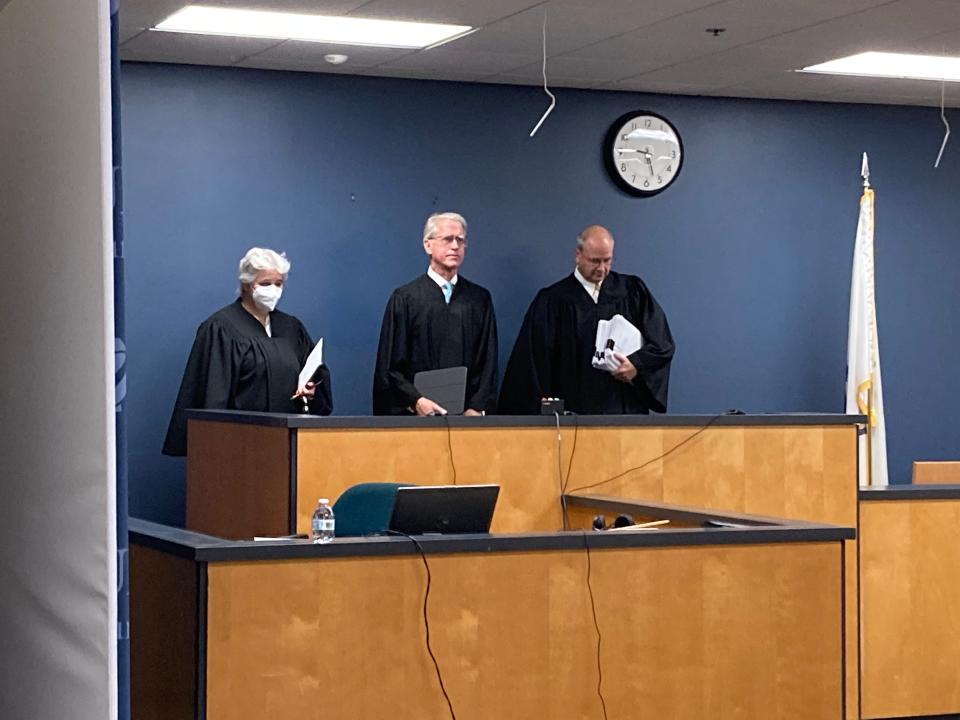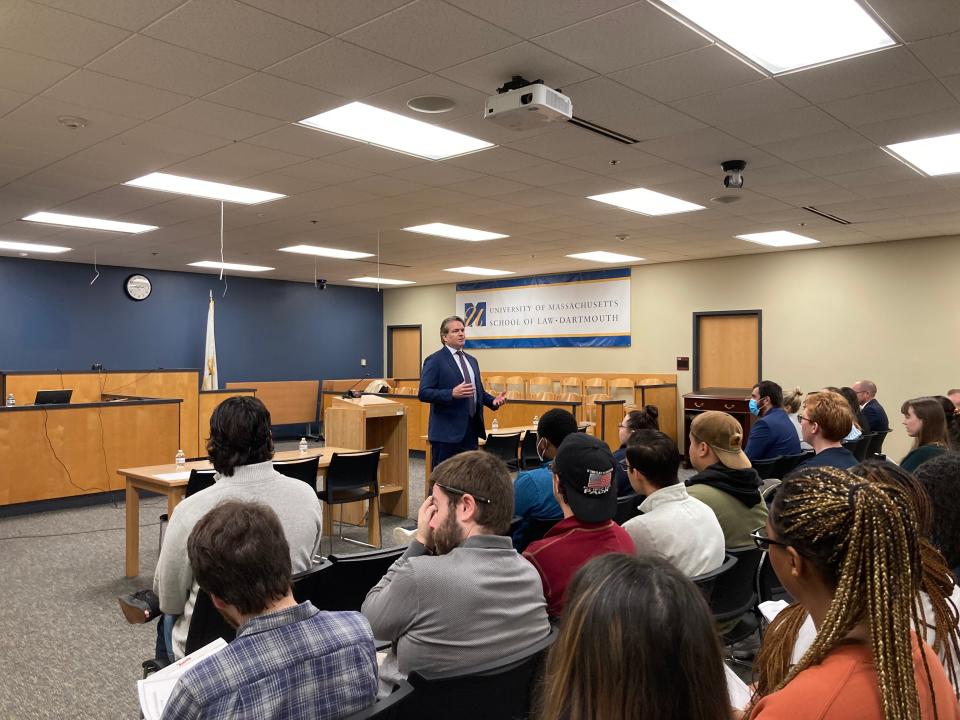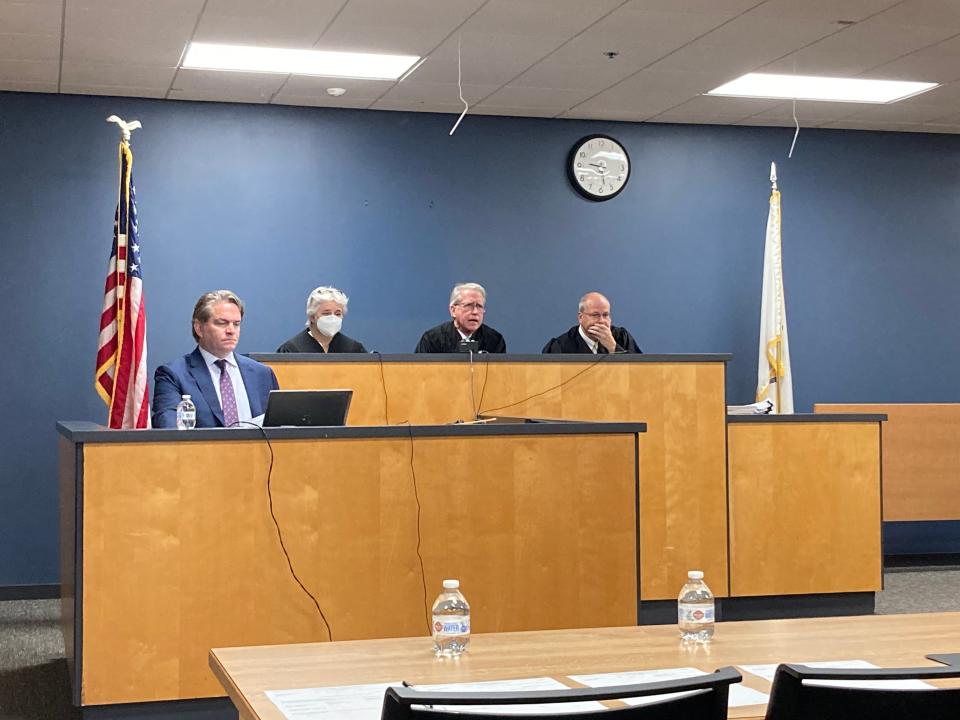'Good real-life experience for us': UMass Law students witness Appeals Court cases
DARTMOUTH — In the same room where University of Massachusetts School of Law students hold trial practice, the three Massachusetts Appeals Court justices heard three criminal and three civil court cases on which they will have to rule.
Third-year law student Amelia Ashworth, after observing the six cases as they were argued before Chief Justice Mark V. Green, Associate Justice Vickie L. Henry and Associate Justice John C. Englander, said it’s really informative to know how the lawyers structured their arguments.
The event on Thursday was one said she wouldn’t want to miss because they can really learn from listening to the oral arguments and watching how the attorneys interact with the justices.
“We took trial practice over the summer, so it was really the first time we ever started even learning how a real trial goes and how to really publicly speak in front of people, and to even perform examinations or cross-examinations or just to speak in front of a judge. So I think the formality of it is always really helpful to try to apply to our studies,” she said.
Brownell Boat Stands: This boat business' products are sold all over the world. Now they're moving to Dartmouth.
It’s not the first time the Appeals Court has heard cases in Dartmouth as part of an effort to broaden public awareness, understanding and accessibility of the Massachusetts court system. The justices will continue to hear oral arguments in cases on appeal at the John Adams Courthouse in Boston during the month.

UMass Law hosted Appeals Court
For third-year law student Amelia DeMelo, it was rewarding that UMass Law was chosen to host the Appeals Court (instead of other law schools that are not close by) and to see how many students were interested in this opportunity to see what it’s like, because usually they read cases every day and talk about them.
She said it was inspiring to see the Appeals Court in action and to hear the lawyers for the defendants and prosecutors make their case as she looks to a future in the law.
“It’s just amazing to have these experienced justices and attorneys just come here and talk about real matters that are happening every single day, and hearing their workload and how much they have to do to prepare,” she said. “It’s just really good real-life experience for us.”

The three criminal cases include an appeal on two counts of assault with intent to rape, three counts of indecent assault and battery and evidence tampering.
The second is an appeal on two counts of indecent exposure in a public restroom in Onset, and the third is the appeal of the imposition of GPS monitoring during probation for disseminating obscene matter harmful to a minor.
One of the civil cases appeals the extension of a restraining order granted in Fall River District Court, and another is based on a claim for violation of the Massachusetts Civil Rights Act based on a land use case in Dennis.
Another case the justices heard could potentially impact the sales tax on cell phone purchases charged by vendors following a state Department of Revenue ruling.

UMass law students question justices
Court Administrator Gina DeRossi has coordinated away-sittings at multiple law schools for the Appeal Court, but it’s special for her to see the students have this opportunity because she is an adjunct faculty member at UMass Law. This year, she helped organize a question-and-answer session.
Several students asked questions about the approach the justices take to studying cases beforehand as well as their interactions with the attorneys before them due to all the back and forth that’s part of this appellate process.
'Beyond civic duty': Fall River businessman is new chair of UMass trustees — why it's 'personal' for him
Afterward, Green spoke about the importance of having this opportunity to exchange with the students but more importantly about giving them the opportunity to go beyond reading about cases for their legal education.
“When you’re reading a case in the books, it’s very different from seeing the way that case law develops in real time,” he said.
When they returned to the courtroom after two years of Zoom meetings, he said he was shocked by how much better it felt, although he had been pleased with how well the justices and attorneys could communicate back and forth on Zoom.
“I lost track of how important it is to have the physicality, the dynamic of in-person exchange in real time as compared to doing it through a screen so I think what we do here is important,” he said. “It’s really important for the public and for the students to be able see it.”
Courts accessible to the public
Henry agreed with the importance of the courts being accessible to the public.
“I think we have a duty to encourage the next generation of lawyers and hopefully demystify the procedure a little bit, making it easier for you to consume it,” she said.
She recommended the students watch their Zoom arguments or Supreme Judicial Court arguments on the Suffolk Law School website about some of the hot issues of the day and hopefully encourage them.
“I think we have a duty to encourage the next generation of lawyers and hopefully demystify the procedure a little bit, making it easier for you to consume it,” she said.
Englander agreed that a live courtroom provides a different dynamic than Zoom and said it makes them better in addition to allowing the public to participate by their presence.
“Part of what we want and what is important is the advocates in front of us are not only representing their clients well, as you’re learning by watching, but are helping us get the right result,” he said. “We want the best advocacy we can possibly get. It makes us better.”
Dean and Professor of Law Eric Mitnick said having the Appeals Court conduct its business in front of the law students provides them with the opportunity to see appellate advocacy in action with real lawyers arguing real cases.
“Judge Green has been really, really great about making sure that the court is accessible to the public and especially to law students who are thinking about doing this,” he said.
Mitnick said the students are encouraged by the director of appellate advocacy programs and the professor who teaches the appellate advocacy course to attend in order to enhance their own competitive skills.
“When they go out and do moot court competitions against other law schools, they’ve been able to see this experience, they’ve seen lawyers being questioned by the hot bench,” he said. “It’s been great, and it’s really nice I think for the law students.”
He said his favorite part is that the Appeals Court always seems to bring back a UMass Law graduate. This year it’s Joey Spadoni, a judicial law clerk who was sitting in the jury box during the session.
Mitnick said most of the students are likely to be interested in both the criminal and civil cases, and while there may be students who have decided to pursue either civil or criminal litigation, it may be that first year students don’t know whether they are more interested in one or the other.
He said with the Appeals Court justices expected to be generalists, prepared to hear all kinds of cases, it’s helpful for the students to be exposed to multiple different types of cases because there’s real value in having a broader perspective and understanding of the law.
Standard-Times staff writer Kathryn Gallerani can be reached at kgallerani@gannett.com. Follow her on Twitter: @kgallreporter. Support local journalism by purchasing a digital or print subscription to The Standard-Times today.
This article originally appeared on Standard-Times: Law students in Dartmouth get a taste of how state appeals court works

